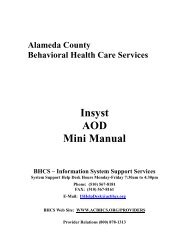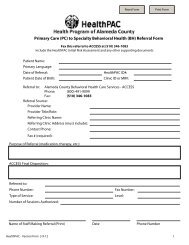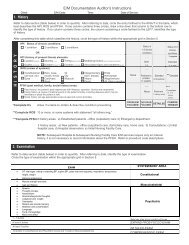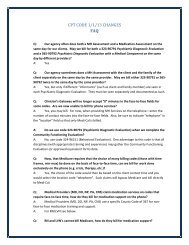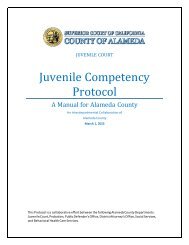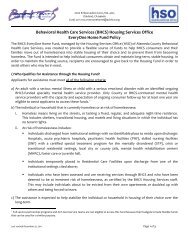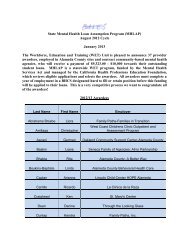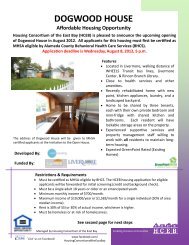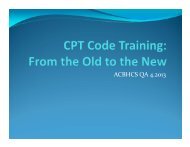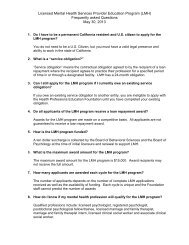COUNTY OF ALAMEDA - Behavioral Health Care Services
COUNTY OF ALAMEDA - Behavioral Health Care Services
COUNTY OF ALAMEDA - Behavioral Health Care Services
Create successful ePaper yourself
Turn your PDF publications into a flip-book with our unique Google optimized e-Paper software.
Alameda County <strong>Behavioral</strong> <strong>Health</strong>care <strong>Services</strong> Request for Quotations TIC-1<br />
Early Intervention<br />
Evidence Based Model<br />
or Practice<br />
Family, Significant<br />
Other, Significant<br />
Support Person<br />
Family-Driven<br />
Family Involvement<br />
Family Member<br />
Family Partnership<br />
Fiscal Year (FY)<br />
Inappropriately served<br />
pop<br />
Usually joined in phrase with the term “prevention”, it means providing<br />
services or treatment early on at the onset of an illness with the goal of<br />
reducing the duration of the disorder.<br />
A model or practice with well-documented effectiveness. An evidencebased<br />
model or practice has been, or is being evaluated, and meets the<br />
following criteria: * Has some quantitative or qualitative data showing<br />
positive outcomes, but does not yet have enough research or replication to<br />
support generalized positive outcomes; or * Has been subject to<br />
expert/peer review that has determined that a particular approach or<br />
strategy has a significant level of evidence of effectiveness in research<br />
literature.<br />
A person, who has provided primary support for, is a primary caregiver<br />
of, or whose daily life is impacted by, being a family member (by<br />
personal or biological definition) of a person who is living with symptoms<br />
of mental illness. Family members may be the biological parents, foster<br />
parents, siblings, spouses, children, aunts, uncles, cousins, friends, or<br />
anyone else whom the consumer defines as “their family members.”<br />
A system of care that involves the family of a youth/consumer in the<br />
process of assessment, identifying treatment options and developing a<br />
treatment plan that is based on and adapted to the youth/consumer‟s<br />
individual needs.<br />
The full participation of family members in all levels of our systems of<br />
care including: direct service peer support, system development<br />
workgroups, clinical teams, training, management, administration, policy<br />
development and legislative advocacy.<br />
An individual who is now or was in the past, either the primary caregiver<br />
or a concerned and involved person who provides a significant level of<br />
support to a person who is living with a severe mental illness (SMI),<br />
serious emotional disturbance (SED) or other mental health issues.<br />
This term has two meanings: 1) Family Partnership is an intentional focus<br />
on working with the consumer as a member of a family unit that offers<br />
insight, strength and support to the consumer's treatment team. 2) Family<br />
Partnerships are programs that include Family Partners as a peer<br />
professional position in the treatment team or direct service unit. Family<br />
Partners are persons who have been primary caregivers of persons with<br />
SED/SMI and have undergone significant training in multi-disciplinary<br />
settings to assist families in understanding and navigating the behavioral<br />
health care system, as well as other systems that they will interact with to<br />
become their own advocates for their families.<br />
Twelve month period from July 1 st - June 30 th , used in the County<br />
accounting and contracting system.<br />
Population for whom current services are ineffective in tthat they are<br />
either offering too many services of the wrong type, duration or modality,<br />
or too little services of the wrong type , duration or modality.<br />
Page 5 of 44




